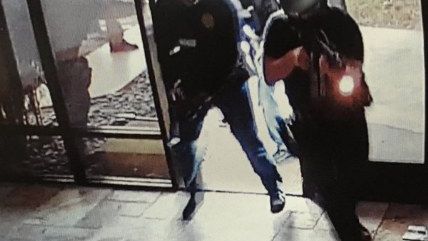Calif. Cops Are Using Meth Lab Law to Keep Going After Legal Medical Marijuana Companies
Raids on facilities and attempts at asset forfeiture.


California laws prohibit the use of butane as part of the chemical process to create cannabis extracts, used for oils and marijuana products that aren't rolled up in joints or used in bongs. It's considered a safety issue. Butane is flammable, and very nasty accidents may happen if the chemical process goes wrong. Some burn centers reported in 2015 that 10 percent of their cases were a result of butane-related hash oil explosions.
The law is generally associated with fighting and shutting down meth labs, but it applies to hash oil manufacturing as well. And this year, marijuana oil extractors who appear to be operating legally under California's medical marijuana laws are seeing this law used as a reason to raid their facilities, arrest people, shut them down, and possibly engage in civil asset forfeiture to take their stuff.
Will Yakowicz, who covers marijuana industry issues at Inc., has a long read about two raids on a San Diego-based cannabis extraction company, Med-West Distributors, why it's happening, and what it potentially means. As California is considering legalizing recreational use of marijuana entirely in November, police are still trying to shut down operations and seize their assets:
The narcotics task force seized $1.4 million in cash, product, and money from various bank accounts belonging to owner James Slatic ($325,570 in cash was found in the safe). Med-West had been providing hundreds of licensed dispensaries around California with medical CO2-extracted cannabis oil and products under the state's medical marijuana laws since 2010. The company was licensed by the city of San Diego and operating openly. Slatic says his company was raided a second time in late June and is now officially closed.
San Diego law enforcement used federal asset forfeiture laws to freeze and seize the company's cash and the money in Slatic's personal bank account, the bank account of his wife (who is a federal employee at Veterans Affairs), and his kids' college savings accounts. The San Diego Sheriff's Office and San Diego County District Attorney's Office declined to explain why they seized Med-West's and the Slatic family's money, but neither has charged Slatic with a crime.
There were similar raids in June on cannabis extract producers in Sonoma County. In each case, authorities claimed that sources told them the companies were using the butane illegally for the extractions. In each case, company representatives insisted that they have not and used other methods. And in both cases the Drug Enforcement Agency (DEA) officials were apparently on hand or involved in the raids.
Their participation matters because, first of all, federal law still has marijuana as an illegal substance. There is a federal regulation that is intended to prevent the DEA from interfering or enforcing federal bans in states where marijuana has been legalized. But officials claim that the facilities are operating illegally and therefore not in compliance with how the state set up its program.
In addition, the involvement of the DEA opens up the possibility of using the federal government civil asset forfeiture laws rather than California's so that police can attempt to take and keep a huge chunk of money they've grabbed from Slatic and his family. The federal government's rules for asset forfeiture are looser than California's and allow law enforcement agencies in California to keep more of the money they seize. Previous studies have shown that while asset forfeitures under California's state laws have remained static over the past few years, there's been a dramatic increase in money seized in the state using the federal regulations.
The raids are not going down well with some California authority figures, Yakowicz notes:
A host of politicians, prosecutors, and district attorneys from all over the country have written letters to the San Diego District Attorney's Office asking them to return Slatic's assets and to stop pursuing criminal charges. In one letter, the group of prosecutors and D.A.'s describe the asset forfeiture as "disturbing and illegal."
Slatic and his lawyer attempted to use the recent Supreme Court precedent in Luis v. United States to try to get their assets unfrozen. That decision determined that it was a constitutional violation to seize a defendant's assets that had no connection or taint to any crime in such a way as to keep them from being able to afford a decent defense. But according to Inc., a judge refused the request, and the prosecution essentially claimed it was all evidence, leaving Slatic to have to launch an Indiegogo campaign to try to pay for his defense (though, again, he hasn't actually been charged with a crime yet).
Read more about the raids here. Asset forfeiture reformers are still trying to toughen California's laws to stop seizures like this. SB443 would attempt to keep California police from seizing and keeping property and assets unless there's an underlying conviction and would attempt to stop them from bypassing state law by participating in the federal program unless there was a conviction. Lynne Lyman, director of California's chapter of the Drug Policy Alliance, told Reason she's hoping for a vote on the bill in the California legislature in August.


Show Comments (8)